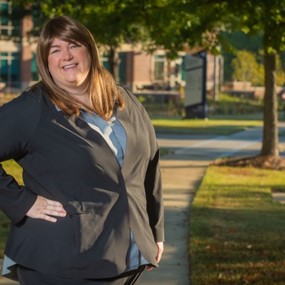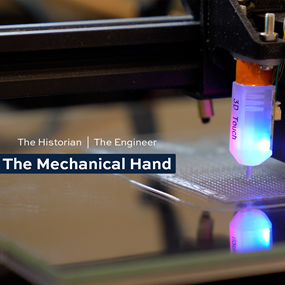Researcher explains requirements and rewards for accessible content creation

Everyone is a content creator. Whether we are talking about a film maker, a government agency or just a person with a social media account, everyone is creating content. How that content is produced, consumed and what it looks like has changed over the years, but the need to make it accessible has not.
“The reason we should make content accessible is because it is the ethical thing to do, but in a lot of cases, it is also the legal thing to do,” explains Dr. Ed Youngblood, an accessibility researcher at Auburn University. “It is a lot cheaper to pay to get your content captioned than to have a lawsuit.”
Most people are familiar with closed captions on TV shows but alt-text and audio descriptions are just as important in creating accessible digital content.
Beyond being the right and legal thing to do, accessible content can ultimately be consumed by more people, is more flexible and can be easier to create than you might think. In this episode of the “Things You Didn’t Know You Didn’t Know” podcast, Dr. Ed Youngblood explains why you should create accessible content and how everyone, from the movie creator to a single social media user, can make digital environments more accessible.
Transcript
Brandon Etheredge:
Research has found that men make up about 33% of eating disorder cases and over recent years have faced escalating social pressures to become unrealistically lean and muscular. However, few programs have been developed to address the needs of men struggling with eating disorders. But work happening now at Auburn University stands to bring new treatments to this often hidden issue.
Welcome to a special episode of the Things You Didn't Know You Didn't Know podcast, part of our celebration of research and creativity. I'm Brandon Etheredge and I'm joined today by Dr. Tiffany Brown. Dr. Brown is an assistant professor of psychological sciences at Auburn University where she studies prevention and treatment of body image and eating disorders, specifically focusing on the LGBTQ+ community, gender differences, and the relationship between brain and body. Her recent work, which is funded in part by the Arlene and Michael Rosen Foundation, stands to disrupt the issue of eating disorders in the male and LGBTQ+ populations and give new tools in the fight against body image issues across the country.
Dr. Brown, thank you for joining the podcast.
Dr. Tiffany Brown:
Thank you so much for having me.
Brandon Etheredge:
Now, you note in your research that eating disorders and muscular dysmorphia have not received a lot of attention from researchers. Give us an idea of how big of a problem we're dealing with here and what eating disorders and muscle dysmorphia actually look like in the population that you study.
Dr. Tiffany Brown:
Yeah, so I think culturally we have this sort of idea that when we hear the word eating disorders, we tend to think about a probably young, thin, white, cisgender, straight, maybe wealthy woman, but really eating disorders don't discriminate across any demographic lines. We know that eating disorders affect people of all genders, sexual orientations, body sizes, ages, SES, race and ethnicity, and so relevant to the work that I've done that does include populations of men and then also LGBTQ+ folks. Within data, like you mentioned, there's really, unfortunately a lot of the research has overlooked these populations in prior work, which has been correcting, which is really encouraging. We really do need more data, but in terms of conservative estimates of prevalence for eating disorders, we see that about 2.8% of men will have an eating disorder in their lifetime, which overall doesn't sound like a really big issue, but if you apply that to the general population, we see that equates to about 4.5 million men just in the United States alone that will have an eating disorder in their lifetime. Again, that's a conservative estimate because it doesn't include a lot of eating disorder diagnoses that do tend to affect men more often.
I would say that overall in terms of eating disorder presentations, I won't go into details just for time's sake about all of the different eating disorder presentations, but eating disorders in men can look very similar to eating disorders in women. They can also look rather different as well and that makes it often pretty common that they're under-detected and under-identified in men. What they could look like could be a variety of presentations, but it could be a man who has a really strict eating or exercise-related pattern. It could be avoiding certain types of foods maybe that are high in fat or high in sugar and tending to over-consume things like protein in a way that actually can be quite unhealthy for the body. Could be having concerns about body weight and shape, but also could be concerns about muscularity, and we'll talk more about that, I know. Could also be going long periods of time without eating, might experience binge-eating episodes where people will have a loss of control and eat a large amount of food and then might compensate for those behaviors as well with either fasting, so going long periods of time without eating, exercising for a long period of time or in a driven or compelled way. More rarely, although it does happen in men, could also include doing things to compensate for food intake like vomiting, laxative use, diuretics as well.
But the key there is really what differentiates an eating disorder from just problematic eating would be distress and impairment, so either being really bothered about these behaviors and/or having some sort of impact on your life, so either your social relationships, your ability to do school. If men are exercising in the middle of the night and you're spending a lot of time at the gym, they might not have time for class, that might interfere with their concentration and ability to do well in classes. Same thing for work or other personal relationships too.
Then another phenomenon that you mentioned, muscle dysmorphia is a lot less well-known and actually technically is not an eating disorder. It's classified as a subtype of body dysmorphic disorder, which is categorized as a subtype of obsessive compulsive-related disorders. But muscle dysmorphia actually shares a lot of features with eating disorders. When we're talking about men, it's a relevant body image concern. Muscle dysmorphia basically is a disorder of disturbed body image where men who are actually quite muscular see themselves as really deficient in muscularity and not muscular enough, and so they engage in a lot of really unhealthy behaviors to try to become more muscular. That could include things like going to the gym, again, excessively, particularly focused on weight lifting and potentially taking steroids or another muscle enhancer. Even though they're not eating disorders, we often do see disordered eating in muscle dysmorphia where we see this really what we call a catabolic eating pattern that is again, really over-relying on protein consumption and often is to the point where it can be dangerous for your kidneys and other body systems and has a lot of the same kind of rigidity that we might see in a traditional eating disorder.
Data in terms of prevalence there, we see about 7% of men in their lifetime might have muscle dysmorphia, so a little bit of a larger number there. Some of what that might look like, again, would be a lot of gym-related activity, but also might be shame about their body and not feeling they're muscular enough, so might wear baggy clothing, those sorts of things, feel uncomfortable disclosing their body to other people or doing the opposite where they actually do try to show off a lot of their body to compensate for that concern.
Brandon Etheredge:
Now you're building this new program called More Than Muscles Project. What is that and how exactly does it work?
Dr. Tiffany Brown:
Yeah, so the body project More Than Muscles is what we call an eating disorder prevention program, but you could also just consider it a body image program that really focuses on using what we call cognitive dissonance, which I'll talk about in just a second to basically help to address body image concerns for men, so both concerns with leanness and muscularity.What we do in these programs is it's actually a two-session, two-hour each, so four hours total basically in the program over a course of two weeks. They're group-based programs, so we have groups of between four to six-plus men in a group led actually by other young men who often, many of whom have struggled with body image concerns in the past as well.
What we do in those programs is we use cognitive dissonance, which is, if you are not familiar with that term basically shows that when you act in a way that contradicts how you think or contradicts your beliefs, we tend to experience what we call dissonance or just psychological discomfort. We as human beings really don't like to contradict ourselves and don't love feeling uncomfortable, so we tend to alleviate that distress by actually matching our thoughts to our behavior. We can actually use that in these group programs to help improve body image by having men actively argue against and confront these really unrealistic cultural ideals to be lean and muscular that are portrayed in traditional media and social media.
What we do is we have them basically engage in a bunch of verbal, written, group-based behavioral activities with these other men in the group to really challenge those cultural pressures. The idea is that that can help decrease that buy-in that we have culturally that leanness and muscularity is the only way to be attractive or valuable as a man or to be masculine. We really confront all those pressures within these programs.
I could go into details probably all day about the type of things that we do in the programs, but just for a couple of examples, really everything is to actively challenge those cultural ideals. We have men do things like between the sessions like challenging body image concerns that they might have. A common one we hear about a lot is something like being able to go to the pool in the summer, here we're in the South, it's really hot, to able to go to the pool without a shirt on for men. That being a big, often, concern that we hear in the groups. We challenge men to do that and then we come back and we debrief, talk about how it went. It's really nice because it's a group-based program, you also have this validation from other men who are experiencing the same things. I think for men in particular, helps them to understand they're not alone in these concerns and that you can actually learn skills to help improve how you feel about your body and your relationship to your body.
Brandon Etheredge:
Now I understand you're a master trainer with the Body Project and some of your work is connected back with the Body Project Program. Can you tell me a little bit about what the Body Project is and how it connects to the current work that you're doing?
Dr. Tiffany Brown:
Yeah, so the More Than Muscles program is actually a adaptation basically of the Body Project. The Body Project is a large program that is, again, cognitive dissonance-based, and it's an eating disorder prevention program or body image program for young women in particular. I think that goes with this cultural understanding that we've had for years where most of our programming, most of our research has been focused on women. I'm a master trainer for that program, so I've gotten to travel across the country training colleges and facilitators to implement that program.
Right now, and this is probably an underestimation too, but the program has been implemented in over 150 college campuses across the US, 25 countries, and the total reach is about 3.5 million young women that have had the program, so really encouraging and something for my research that I would love to be able to get there for this side for men as well. But we, in our work, basically adapted that programming for women to actually be relevant for men because the Body Project really just addresses primarily thinness-based concerns. We know that certainly men can experience a heaviness concerns and thinness concerns regarding body image, but it's really missing a large part of muscularity and also how those things tie into masculinity and other sorts of cultural norms for men. We took that programming and adapted it actually with several focus groups and input from young men who within the age range just to make sure that we were actually incorporating men's experiences too, given that I don't identify as a man and so my experience is not going to translate there even if I know a ton of it in terms of the research. We did that as a group team to make sure that the program was relevant and we've refined it over time in the years since we started the program.
Brandon Etheredge:
Now, in addition to your current work, you've previously developed the Pride Body Project. What is the status of that program and what has the impact been with that?
Dr. Tiffany Brown:
Yeah, sure. The Pride Body Project is also a dissonance-based program, so like you said, they all kind connect together. But that program in particular was specifically developed for what we call sexual minority men. I know that's not a term that most people actually use out there in the world, but that would refer to men who identify as gay, bisexual, plus, any non-heterosexual identity. We specifically developed that program because there is evidence that sexual minority men do have an increased risk for body image-related concerns and eating disorders compared to non-sexual minority men. Obviously that's not the only risk factor because we have a whole program that's for men generally regardless of orientation. But within that trial, we did initial small trial of that program and found really encouraging results where we found decreases in body dissatisfaction, drive for muscularity, how much you see your body as an object rather than you as a person. Also decreased internalization of those lean muscular body ideals, so how much you buy into that ideal, reduced problematic dietary restraint. And also bulimic symptoms, so that binge-eating and compensatory behaviors that I talked about earlier.
We found that compared to an assessment-only control, so basically people just completing assessments but not doing anything else, we found that those effects maintained for a whole month after men completed the program, which again is really encouraging given it's only four hours long. We're now testing that program, actually have been for the last five years, in a really large-scale trial in southern California where I was prior to coming to Auburn, and we're wrapping that study up, which is really exciting, in the next year or so. We tested that program in about 300 sexual minority men in Southern California. Again, really exciting work. We don't know the results yet, but we should be knowing that within the next couple of years. We're following men through actually a two-year follow-up period, so for a long period of time. We, with that, are going to be able to actually see if not only can we improve some of these risk factors for eating disorders for muscle dysmorphia, but can we actually prevent the onset of an eating disorder, which is the ultimate test of a program that's trying to prevent eating disorders is actually can you truly prevent them? That just takes a lot of time to be able to determine.
That's where that program is at. If we do find similar effects to what we found in our initial trial, the goal would be ultimately to be able to implement that program across college campuses for young sexual minority men, but then also within LGBTQ+ health centers across the country too. Hopefully we will be getting there in future years.
Brandon Etheredge:
I want to get back to your current work, the More Than Muscles Program. How does that fit into this larger program and what is your goal with More Than Muscles?
Dr. Tiffany Brown:
Yeah, so with More Than Muscles, I'm really excited about where we're at and where we're going. We are midway through a larger-scale trial of that program. I mentioned that I just recently started here at Auburn within the last year and prior to that I was at an institution in San Diego. We did ran about 100 men to either More Than Muscles or an active control condition, so the next step in testing that program out, and we got funding from the Arlene and Michael Rosen Foundation, which is a really wonderful mental health charity that focuses on specifically men's mental health. They are funding that program to continue here in Auburn as well. We're going to be recruiting another 100 or so men to participate in the program from anywhere in the state of Alabama and also anywhere in Georgia. We just started recruiting for that program actually about a month ago. We're hoping to start our first set of groups soon, which is really exciting.
But the cool thing about obviously the pandemic has caused a lot of incredible difficulties and huge long-lasting changes on mental health, physical health, obviously everything, but we did find that we actually started going online and doing more virtual-based programming. That's an artifact where now this trial, it's a fully virtual program, which I think is actually really exciting to be able to increase the reach. Again, we're recruiting men all across the state of Alabama that can participate and the same thing in Georgia. It's really nice opportunity to have people from different areas be able to connect in these groups and again, have that sense of I'm not alone in experiencing these things.
But again, in that trial, we're going to be comparing More The Muscles to an active control condition. We're following men through a six-month follow-up, so a little bit of a longer period of time to see if we do have any preventative effect or if we can just maintain our effects for a longer period of time.
Then ultimately, if we find similar effects in that trial, which should be wrapping up in the next couple of years, we would really love to be able to implement the program or get it out there across college campuses. I've actually had a lot of interest and inquiries from college campuses that have wanted to expand their body image programming for young men, just reinforcing how much this actually is a really important issue that we should be studying and working on. That's exciting for us and our team, certainly. Our goal is that hopefully we can get the program out there, we just want to make sure that it really works and we're really confident that it works before we take that step.
Brandon Etheredge:
Now, as you've done work to develop this treatment program, you've actually conducted tests both here and in other countries. Why is that something that you took time to do?
Dr. Tiffany Brown:
Yeah, so I have some really wonderful colleagues in Brazil and they had reached out initially just expressing interest after we published our first trial of More Than Muscles and just seeing how much there was a really strong need for that kind of programming in Brazil. There really were no body image programs, certainly for men, and really limited even larger resources for eating disorders within Brazil and obviously, it was just a huge country. We partnered together basically to test the More Than Muscles Program. Obviously I do not speak Portuguese, and so I was not going to even touch trying to translate things, but again, they're a really wonderful team and they were able to translate the program, we got them trained in everything, and they did an exceptional job of basically recruiting 180 men in Brazil to participate in either the program or an assessment-only control. We found basically really comparable results through one month and actually they looked through six-month follow-up as well, that we had improvements in body appreciation, body image concerns, disordered eating, muscle dysmorphia symptoms.
The reason why we wanted to do that, one, just I think when anyone expresses a need and wants to seize a gap in what could be fulfilled, obviously if I can do that and if the work that we're doing can reach that group, we would love to be able to do it. But also I think certainly body image concerns are a global issue for women, for men, for all genders. Ideally, the programs that we're making, we don't want them to just work here in the United States or just work regionally, so again, being able to see this across the United States and then also across the globe is the ultimate goal of all this work.
We wanted to make sure that it worked just as well in Brazilian men, and if it didn't, then that's really important to know too, so that we could work on maybe there need to be certain cultural adaptations, things that we need to do differently. I think that that will be a question again for doing more of this type of work across different countries. But that was the general goal, to make sure that these programs are applicable not just in the United States, but also more broadly so that ideally we can reach more men and help more folks with body image concerns.
Brandon Etheredge:
Now, I know this has been an intensive study to determine the validity of this tool. What has your work found about the results from this method of treatment?
Dr. Tiffany Brown:
Yeah, so again, we've seen really encouraging results across these trials, consistent improvements in body image-related concerns, so both body fat dissatisfaction, muscularity dissatisfaction, also, again, internalization or how much you buy into those, lean, muscular, unrealistic appearance ideals. Then really consistent results with reductions in overall what I would call traditional disordered eating symptoms, and then also muscle dysmorphia-related symptoms as well.
What is really cool I think in the work that we're doing with men is that in women, these programs have just looked at preventing eating disorder symptoms, traditional eating disorder symptoms, but in men, we do know that muscle dysmorphia is also a relevant body image concern. There's currently no treatments for muscle dysmorphia per se. There are treatments for body dysmorphic disorder, but there's not anything specific for muscle dysmorphia. What we're finding is that we can basically target both sets of those symptoms through reducing that internalization of a lean muscular body ideal. We can, so to speak, kill two birds with one stone, which just from a program perspective is really great that if men do have body image concerns in either of these arenas since they can often overlap, you can potentially help those concerns with one program.
I will say though that again, this is a body image program and a preventative program, so it's not something that necessarily would be applicable or appropriate for someone with an active eating disorder already. Although I will say we've had men who are in various stages of recovery from an eating disorder in the program that need to work on body image concerns, and it's been really helpful in that regard as well.
Brandon Etheredge:
As we get ready to wrap up, let's talk about next steps. I understand you have a list of organizations that are wanting to implement this program in their work. If a listener has a friend or family member dealing with an eating disorder or muscle dysmorphia, when will this treatment program be available and what options are out there now to be able to help if someone needs help now?
Dr. Tiffany Brown:
Yeah, great question. I think the process of research, unfortunately, I love research and it's also so incredibly slow, which is really frustrating when people are really wanting something now. I know, as I mentioned, there have been a lot of colleges that have reached out wanting to have the More Than Muscles program at their school, which is really exciting. We've just been waiting to make sure that we really know that it works first because we really just wouldn't want to put something out there that is not effective or not efficacious and then could therefore or potentially be harmful. We're really just wanting to make sure we have solid evidence before we go that route. But we're hoping to wrap the current trial that we're doing here at Auburn by 2024 and with the goal of being able to get the program out there after that point.
In the meantime, certainly obviously if there are folks listening who might have a loved one or be interested in this programming and would want to participate in a research study, we are currently recruiting again in Alabama and Georgia for the More Than Muscles study. Folks are welcome to get in touch with me and we'll put contact info in the notes for the podcast. But if someone's actually currently struggling or knows somebody who's struggling with an eating disorder or muscle dysmorphia, there are also treatment options available. Certainly, again, as I mentioned, this is more of a preventative program, a program that's more focused on body image concerns more generally. If someone is having consistent problems with their eating behavior rising to the level of an eating disorder or clinical levels of muscle dysmorphia, then really treatment would be the best option versus these more body image-focused programs.
Locally we do have actually the Auburn Eating Disorders Clinic run through the Auburn University Psychological Services Center where we do treat eating disorders and also body image disorders like muscle dysmorphia. If folks live outside of the area of that reach, there are also some really great resources through the National Eating Disorders Association, which we'll link to, and also through Eating Disorders Hope as well. Again, there are great treatments out there. It can be difficult finding them, and I'm also always happy if there are specific questions that folks have. I've had folks reach out to me as well, and I'm happy to try to do what I can to connect people with appropriate resources.
Brandon Etheredge:
Well, Dr. Brown, thank you so much for giving us an inside look at your work and the treatments that you're developing to help so many people struggling with eating disorders. To all of our listeners here in America and around the world, we thank you for joining us for another episode of the Things You Didn't Know You Didn't Know podcast. Make sure you subscribe to the show on whatever platform you listen to podcasts and leave us a five-star review. It helps us out more than you know. We'll see you next time on the Things You Didn't Know You Didn't Know podcast.
Things You Didn't Know You Didn't Know is a production of the College of Liberal Arts at Auburn University. To learn more about our faculties' life-changing research, visit cla.auburn.edu.






